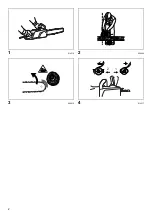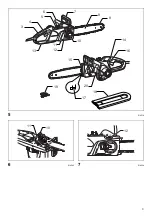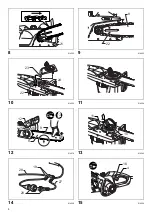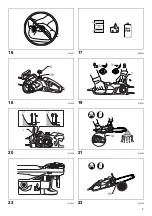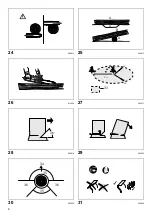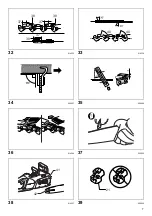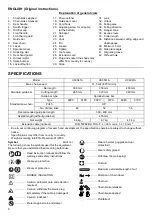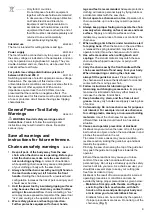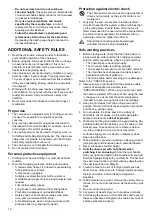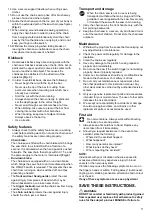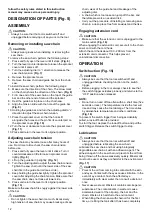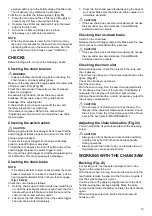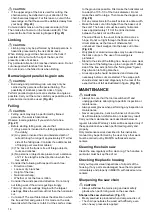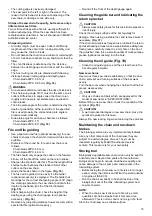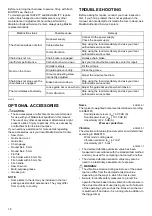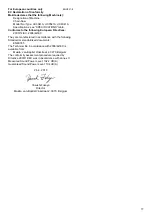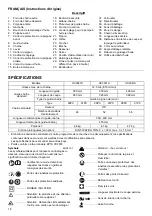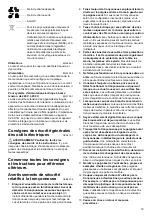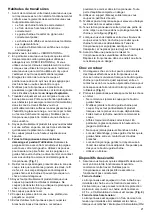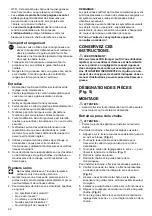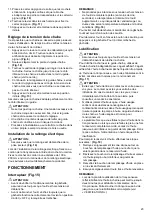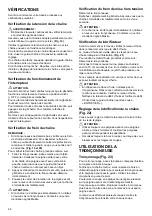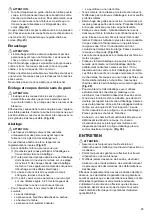
11
14. Use a secure support (trestle) when cutting sawn
timber.
15. Do not use the chain saw to prise off or brush away
pieces of wood and other objects.
16. Guide the chain saw such that no part of your body is
within the extended path of the saw chain (see figure).
(Fig. 2)
17. When moving around between sawing operations,
apply the chain brake in order to prevent the chain
from being operated unintentionally. Hold the chain
saw by the front handle when carrying it, and do not
keep your finger on the switch.
18. Withdraw the mains plug when taking breaks or
leaving the chain saw unattended. Leave the chain
saw where it cannot present a hazard.
Kickback
1. Hazardous kickback may arise during work with the
chain saw. Kickback arises when the tip of the bar (in
particular the upper quarter) comes into contact with
wood or another solid object. This causes the
chainsaw to be deflected in the direction of the
operator.
(Fig. 3)
2. In order to avoid kickback, observe the following:
• Never begin the cut with the tip of the bar.
• Never use the tip of the bar for cutting. Take
particular care when resuming cuts which have
already been started.
• Start the cut with the chain running.
• Always sharpen the chain correctly. In particular,
set the depth gauge to the correct height.
• Never saw through several branches at a time.
• When limbing, take care to prevent the bar from
coming into contact with other branches.
• When bucking, keep clear of adjacent trunks.
Always observe the bar tip.
• Use a trestle.
Safety features
1. Always check that the safety features are in working
order before starting work. Do not use the chain saw if
the safety features are not working properly.
–
Chain brake:
The chain saw is fitted with a chain brake which brings
the saw chain to a standstill within a fraction of a
second. It is activated when the hand guard is pushed
forwards. The saw chain then stops within 0.15 s, and
the power supply to the motor is interrupted.
(Fig. 4)
–
Run-down brake:
The chain saw is equipped with an run down brake
which brings the saw chain to an immediate stop when
the ON/OFF switch is released. This prevents the saw
chain from running on when switched off, and thus
presenting a hazard.
– The
front and rear hand guards
protect the user
against injury from pieces of wood which may be
thrown backwards, or a broken saw chain.
– The
trigger lockout
prevents the chain saw from being
switched on accidentally.
– The
chain catcher
protects the user against injury
should the chain jump or break.
Transport and storage
When the chain saw is not in use or is being
transported, withdraw the mains plug and fit the
guide bar cover supplied with the saw. Never carry
or transport the saw with the saw chain running.
1. Carry the chain saw by the front handle only, with the
bar pointing backwards.
2. Keep the chain saw in a secure, dry and locked room
out of the reach of children. Do not store the chain saw
outdoors.
Maintenance
1. Withdraw the plug from the socket before carrying out
any adjustments or maintenance.
2. Check the power cable regularly for damage to the
insulation.
3. Clean the chain saw regularly.
4. Have any damage to the plastic housing repaired
properly and immediately.
5. Do not use the saw if the switch trigger is not working
properly. Have it properly repaired.
6. Under no circumstances should any modifications be
made to the chain saw. Your safety is at risk.
7. Do not carry out maintenance or repair work other
than that described in this instruction manual. Any
other work must be carried out by authorized service
centers.
8. Only use genuine replacement parts and accessories
intended for your model of saw. The use of other parts
increases the risk of accident.
9. We accept no responsibility for accidents or damage
should non-approved bars, saw chains or other
replacement parts or accessories be used.
First aid
Do not work alone. Always work within shouting
distance of a second person.
1. Always keep a first-aid box to hand. Replace any
items taken from it immediately.
2. Should you request assistance in the event of an
accident, state the following:
• Where did the accident happen?
• What happened?
• How many persons are injured?
• What injuries do they have?
• Who is reporting the accident?
NOTE:
Individuals with poor circulation who are exposed to
excessive vibration may experience injury to blood
vessels or the nervous system.
Vibration may cause the following symptoms to occur in
the fingers, hands or wrists: “Falling asleep” (numbness),
tingling, pain, stabbing sensation, alteration of skin colour
or of the skin.
If any of these symptoms occur, see a physician!
SAVE THESE INSTRUCTIONS.
WARNING:
DO NOT let comfort or familiarity with product (gained
from repeated use) replace strict adherence to safety
rules for the subject product. MISUSE or failure to


